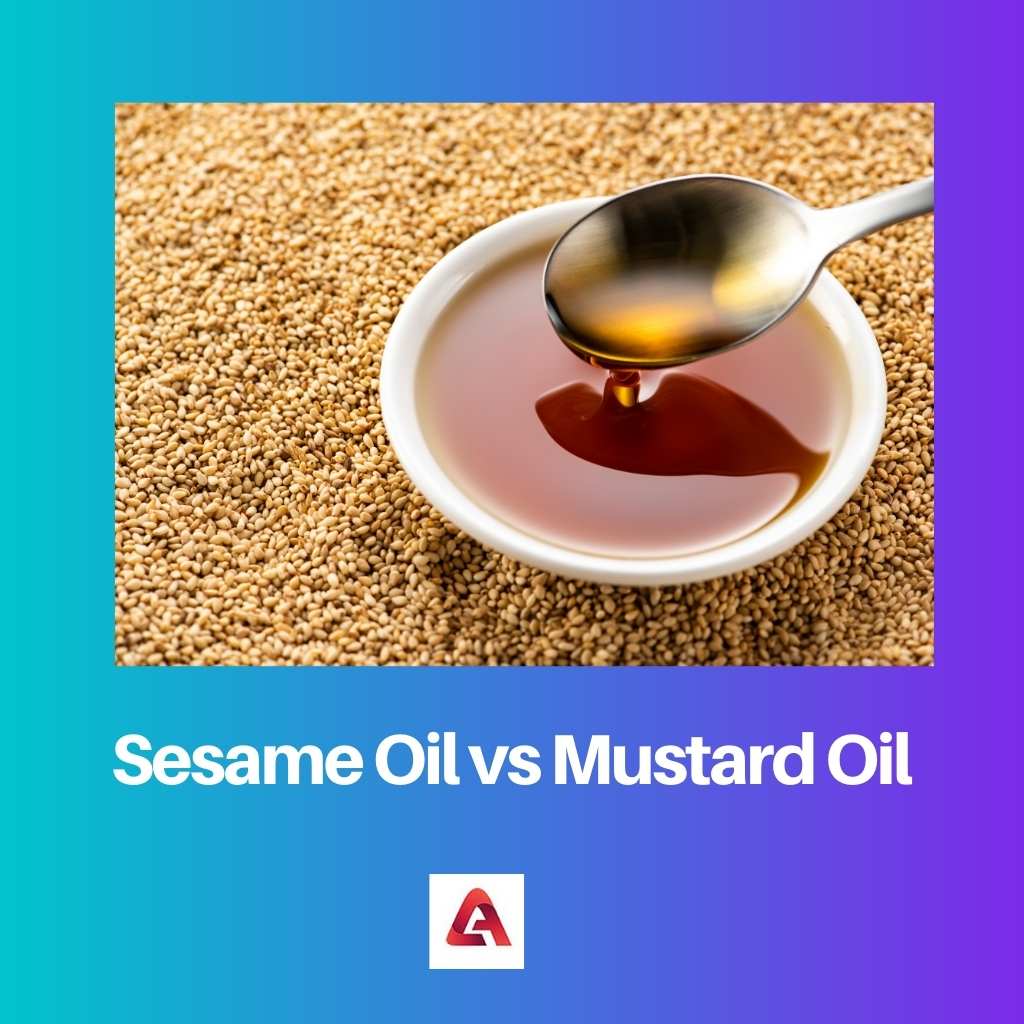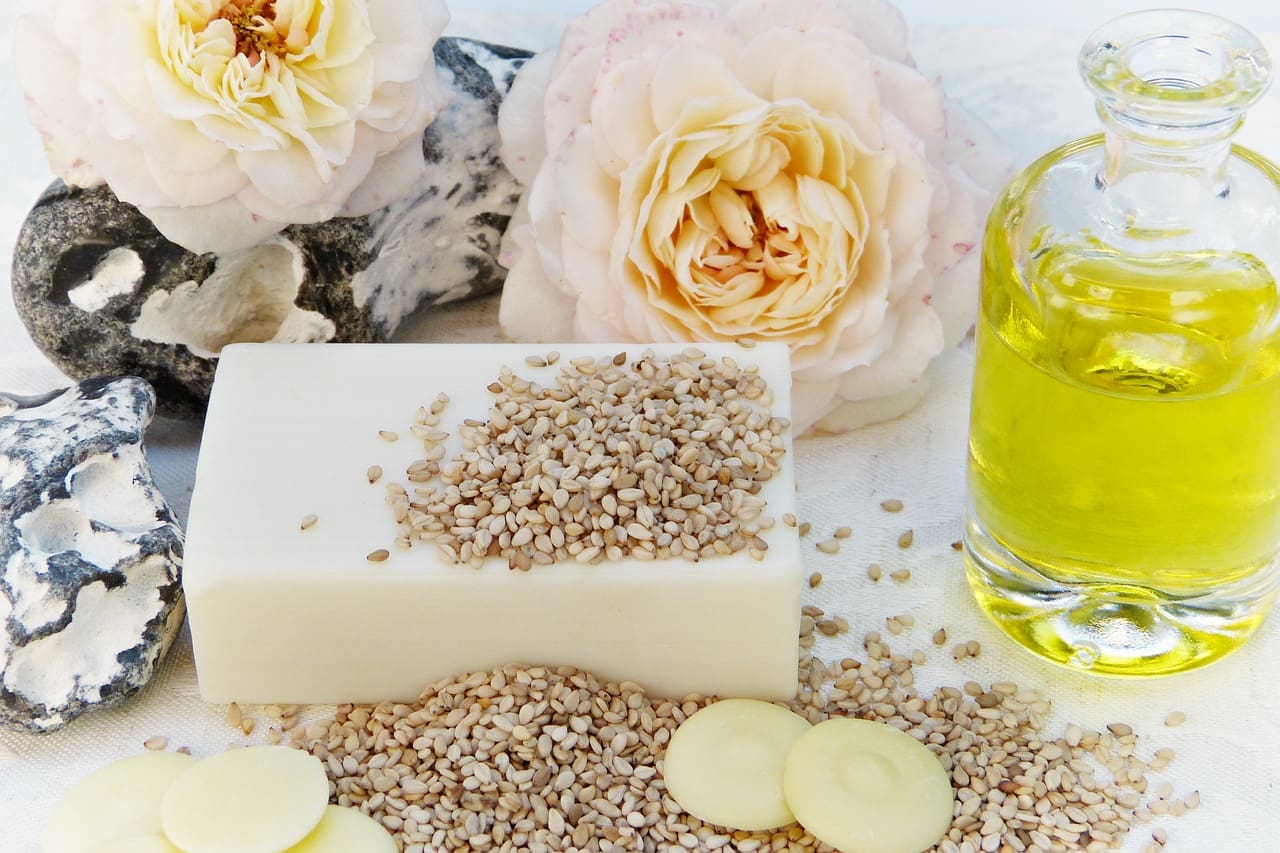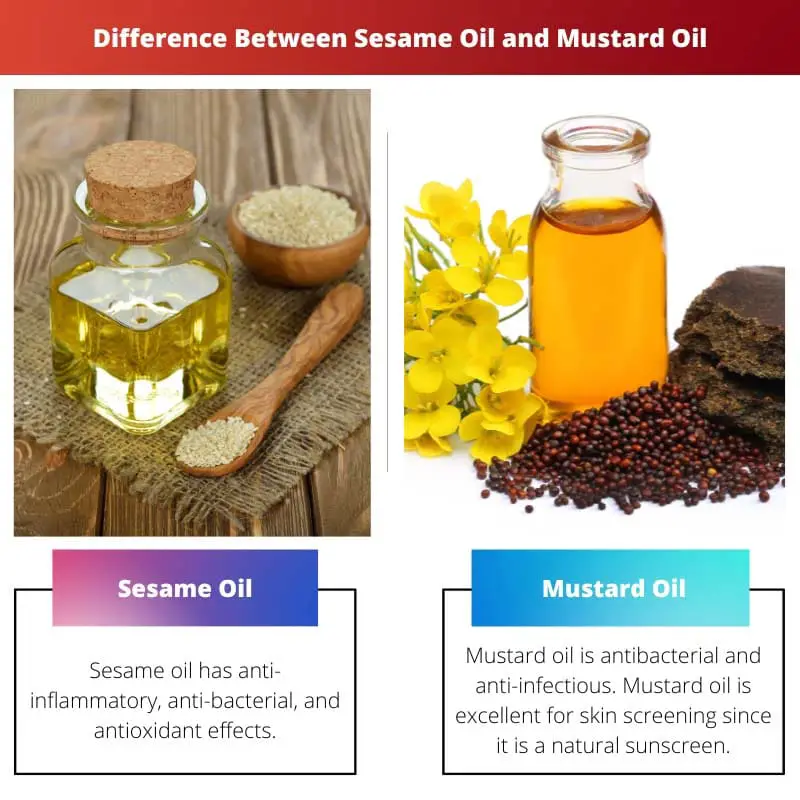Sesame oil is made by pressing sesame seeds to extract the oil. Sesamum Indicum is the botanical name for the plant from which sesame oil is derived.
However, Mustard oil is made by extracting the oil from indigenous mustard seeds. Brassica Juncea is a botanical plant related to Mustard oil.
Key Takeaways
- Sesame oil has a nutty flavor and is commonly used in Asian cooking.
- Mustard oil has an intense flavor and is popular in Indian cuisine.
- Sesame oil has a higher smoke point than mustard oil, making it better for frying.
Sesame Oil vs Mustard Oil
Sesame oil is made from sesame seeds and has a nutty flavor, while mustard oil is made from mustard seeds and has a pungent taste. Sesame oil is used in Asian cooking, while mustard oil is popular in Indian cuisine but not recommended for consumption due to potential health risks.

Sesame oil has anti-inflammatory, anti-bacterial, and antioxidant effects. Sesame oil benefits the skin by reducing bacterial infections, healing damaged skin cells, slowing down the aging process of the skin, acting as a fantastic moisturizer, aiding in skin detoxification, and acting as a natural sunscreen.
Sesame oil has several health benefits, including improving bone health, avoiding cancer, promoting cardiovascular health, preventing diabetes, and lowering blood pressure.
Mustard oil is antibacterial and anti-infectious. Mustard oil is excellent for skin screening since it is a natural sunscreen, a component of lip care, treatment for infections and rashes, aids in the stimulation of sweat glands, lightens the skin, and aids in the removal of dark spots and tans.
Mustard oil is used for massaging. It soothes cough and colds, lowers the risk of cancer, aids digestion, slows the progression of cardiovascular disorders, and is beneficial for hair and skin.
Comparison Table
| Parameters of Comparison | Sesame Oil | Mustard Oil |
|---|---|---|
| Appearance | Yellow in color | Dark brown in appearance |
| Smell | Nutty odor | Pungent smell |
| Botanical plant name | Sesamum Indicum | Brassica Juncea |
| Extracted from | Sesame seeds | Mustard seeds |
| Properties | Anti-inflammatory, anti-bacterial properties along with rich antioxidants. | Anti-bacterial and anti-infectious properties |
What is Sesame Oil?
Sesame oil benefits the skin by reducing bacterial infections, aiding in the healing of damaged skin cells, slowing the aging process of the skin, acting as a fantastic moisturizer, aiding in skin detoxification, and acting as a natural sunscreen.
The oil from sesame seeds is extracted to make sesame oil.
Sesame oil is high in antioxidants and has anti-inflammatory and antibacterial properties. Sesame oil has various health benefits, including improving bone health, avoiding cancer, promoting cardiovascular health, preventing diabetes, and lowering blood pressure.
Sesamum Indicum is the generic name of the plant from which sesame oil is derived. Sesame oil is yellow and has a nutty flavor.
It’s chock-full of vitamins and minerals. When stored in the kitchen, sesame oil is used to dress salads and as a component of margarine.

What is Mustard Oil?
Mustard oil is used for massaging. It soothes cough and colds, lowers the risk of cancer, aids in digestion, slows the progression of cardiovascular disorders, and is beneficial for hair and skin.
Mustard oil is made by extracting the oil from mustard seeds grown locally.
Mustard oil is excellent for screening since it is a natural sunscreen, a component of lip care, treatment for infections and rashes, aids in the stimulation of sweat glands, lightens the skin, and aids in the removal of dark spots and tans. Brassica Juncea is the botanical name for the plant connected with Mustard oil.
Mustard oils in their raw form are dark brown in having a pungent odor. Refined mustard oil, on the other hand, has a significantly lower odor.
Mustard oil is mostly used for dressing salad vegetables, preparing pickles, and cooking. Antibacterial and anti-infectious effects are found in mustard oil.

Main Differences Between Sesame Oil and Mustard Oil
- Sesame oil is prepared by extracting the oil from the Sesame seeds. On the other hand, Mustard oil is prepared by extracting the oil from the local seeds of mustard.
- The botanical name of the plant from where sesame oil is extracted is called as Sesamum Indicum. On the other hand, The name of the botanical plant associated with the Mustard oil is Brassica Juncea.
- Sesame Oil appears yellow with a nutty flavor. It contains nutrients in abundance. On the other hand, The crude form of the Mustard oils appears dark brown in appearance possessing a pungent smell. However, refined mustard oil possesses comparatively less odor.
- Sesame oil, when put in the kitchen, is used for dressing salad and as an ingredient in margarine. On the other hand, Mustard oil is used basically for dressing the vegetables for salads, making pickles, and frying.
- Sesame oil possesses anti-inflammatory, anti-bacterial properties along with rich antioxidants. On the other hand, Mustard oil possesses antibacterial and anti-infectious properties.
- Sesame oil is good for the skin as it reduces bacterial infections, helps in repairing damaged skin cells, slows down the aging process of the skin, acts as a great moisturizer, helps in detoxification of the skin, and acts as a natural sunscreen as well. On the other hand, Mustard oil is great for screening, as it serves as a natural sunscreen, a part of lip care, treats infections and rashes, helps in stimulating sweat glands, lightens the skin, helps in removing dark spots and tans.
- Sesame oil possesses several health benefits such as boosting bone health, helping in preventing cancer, motes cardiovascular health, helps in preventing diabetes, and reducing blood pressure. On the other hand, Mustard oil possesses several health benefits like it is used for massaging, it relieves cough and cold, it reduces the risk of cancer, helps in stimulating digestion, slows down the issues related to cardiovascular diseases it’s good for hair and skin.

- https://link.springer.com/article/10.1007/s13197-011-0540-8
- https://akjournals.com/view/journals/066/42/1/article-p109.xml




